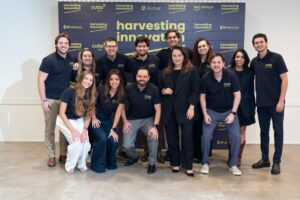As agriculture technology has increasingly crept into the psyche of entrepreneurs and venture investors globally, the number of groups popping up to support the development of startups in the space has grown exponentially.
By our count, there are about 20 different agtech-focused accelerators and incubators globally, and that doesn’t count the general players that are getting into agtech more and more. How accelerators and incubators are defined really varies. But accelerators largely focus on providing startup funding to very early stage companies and entrepreneurs in return for potentially housing them in an office space for a few weeks or months, and preparing them for a pitch day attended by investors in the hope they will successfully make it to the next funding stage. Incubators usually take a longer term approach and are often for more developed businesses. Most accelerators will only invest at the very beginning while some will reserve capital for occasional follow-on funding.
Today, a new style of accelerator has hit the market, bringing together a serious list of strategic ag players, investors, universities, and advisors to discover new technologies, build businesses from them, and invest in them throughout the lifecycle.
The AgTech Accelerator, based out of Research Triangle Park, in Durham, North Carolina, launched today after bringing in investment from agribusinesses Syngenta and Bayer CropScience, and a mix of venture capital firms: Alexandria Venture Investments, the venture arm of the real estate business, which has led the initiative from the start, ARCH Venture Partners, agbio-focused VC Flagship Ventures, and a group of life sciences-focused VCs from Durham, New York, and Nashville, Harris & Harris Group, Hatteras Venture Partners, Pappas Capital, and Mountain Group Capital. A representative from all of these investors has a seat on the board of directors, which will assess every deal.
AgTech Accelerator, which so far has raised $11.5 million of an overall $25 million to $30 million target, is somewhere between an accelerator and an incubator, and then some. It will invest around $500k at the very early stages of an agtech startup’s life — in some cases actually building businesses from technologies it finds — and will then commit follow-on funding of up to $5 million for a Series A. Its syndicate of investors also presents a ready source of capital and network for later funding rounds, according to John Dombrosky, CEO of AgTech Accelerator.
“What we’re doing and how we’re defining acceleration is a bit different,” he said. “We’re scanning the landscape for technology like other accelerators, and it will be hard to get in the front door, but once companies are in, we will be committed to driving them towards reaching their milestones, and to getting them through subsequent funding rounds. Hopefully, we have built a consortium of investors that’s ready to fund the company through the lifecycle, which then leaves the companies free to focus on their milestones and not spend too long worrying about funding rounds, which are really hard to do in the real world.”
In sourcing and incubating agtech startups, AgTech Accelerator will leverage a network of research partners, which so far includes: Duke University; North Carolina State University; Penn State University; Purdue University; University of California, Davis; University of North Carolina at Chapel Hill; and Washington State University.
Through these partnerships AgTech Accelerator will source technologies to bring on, potentially bringing different technologies together to form businesses.
“The agriculture and university sectors are very siloed, and that’s part of the mispricing of agtech and research that we see,” said Jeff Rosichan, chief scientific officer of AgTech Accelerator. “We can build a bridge between research institutions and entrepreneurs and bring together seemingly disparate technology sets at the university level and twist them together into forming companies.”
Rosichan, who spent 15 years at Dow AgroScience, latterly as new technology leader, expects the accelerator’s advisory board to help in this endeavor, bringing commercial acumen to research institutions.
“This bringing together of different technologies will usually start with one founder but then the science advisory board has so many connections out to universities that if we think another technology will suit the company, we can get twist them together,” he added.
Dombrosky and Rosichan also expect their network of investors to play a large role in the company curation process, and they expect to bring on more strategic investors — potentially from other parts of the blue chain — before the end of the year.
While Dombrosky and Rosichan ultimately want their companies to end up in Research Triangle Park — “it’s a brilliant place and an epicenter for agtech to emerge and thrive” — it’s likely some of the companies will remain at the universities they’ve emerged from, or nearby incubators, especially as they can utilize university facilities.
Dombrosky expects to put two businesses in front of the board before the end of the year and, while there is a clear leaning towards life sciences among partners, the accelerator will look to include digital agtech startups, particularly as he used to work in software for Thomson Reuters before joining Syngenta as head of marketing and M&A manager for North America.
AgTech Accelerator has borrowed its model from sister organization and strategic partner Accelerator Corporation, which has led similar initiatives in the life sciences and biotech sectors for 13 years.
Have news or tips? Email [email protected]





